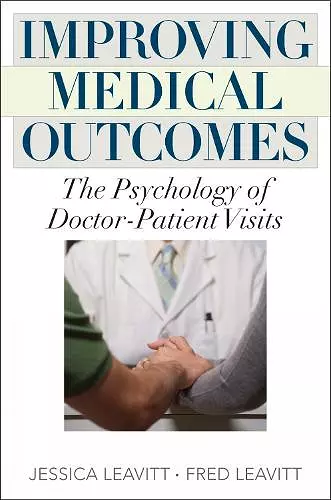Improving Medical Outcomes
The Psychology of Doctor-Patient Visits
Fred Leavitt author Jessica Leavitt author
Format:Hardback
Publisher:Rowman & Littlefield
Published:16th Oct '11
Currently unavailable, our supplier has not provided us a restock date

The problems faced by medical doctors and automobile mechanics are in some ways quite similar—something isn't working right and must be fixed. They must both figure out the cause of malfunctions and determine the appropriate treatments. Yet, the mechanic has no need to worry about an automobile's psyche; the specific mechanical factors are the only ones that come into play. In health care, however, the factors influencing outcomes are broader, more complicated, and colored by the underlying psychological factors of those involved. These factors have profound effects. Doctors are often influenced by patients' description of symptoms, yet information is often incomplete or inaccurate or colored by the patient's own experiences. The doctor's own demeanor may greatly affect outcomes, as can the doctor's ability to interpret the ever-expanding medical literature. These underlying influences are often not acknowledged, and yet they can have far-reaching consequences. Acknowledging these psychological factors and learning how to overcome them are the first steps in improving communications between doctors and patients and to improving diagnosis and treatment. Here, the authors offer strategies for remedying the situation and moving forward to a better understanding of doctor-patient visits and their outcomes.
Jessica Leavitt (member, California Board of Vocational Nursing & Psychiatric Technicians) and Fred Leavitt (psychology, California State Univ.; Evaluating Scientific Research) outline the psychological aspects of doctor-patient relationships and how they affect medical care. While aimed mostly at health-care providers and medical students, the book is accessible to consumers and can be a source of valuable information. It covers major areas of doctor-patient communication, including interpretation of medical information, decision making and bias, medical diagnosis and reducing diagnostic errors, prescribing drugs, the placebo effect, complementary and alternative medicine, and patient social-connectedness. The Leavitts show some of the pitfalls in communicating effectively with patients, making diagnostic decisions, interpreting medical information, and prescribing medication. Throughout, they alert physicians to these hazards and offer tips to help avoid them. Each chapter also concludes with a short list of tips for the patient. VERDICT Recommended for health-care providers, medical students, and doctors—this may be a source of interest to general readers with upcoming doctor’s appointments. * Library Journal *
Jessica and Fred Leavitt's book, Improving Medical Outcomes, is an ambitious and far-reaching effort to suggest ways of delivering better health outcomes in a wide variety of areas....The Leavitts... identify physicians as well as patients as their target audience....Meticulously researched....Improving Medical Outcomes offers a pragmatic and useful approach for physicians as well as patients interested in doing exactly what its title proposes. Implementing even some of its suggestions will likely have this effect and, by extension, will likely increase the value of care provided, benefiting not only individuals but society as well. * JAMA: The Journal of the American Medical Association *
In a succinct organized fashion the authors aim to improve medical outcomes by highlighting common errors made by clinicians and offering solutions. . . .I loved this book! This well-written, well-researched book will be required reading for my faculty development fellows. I believe it truly will improve medical outcomes for your patients and for your learners’ patients. * Family Medicine *
Improving Medical Outcomes will open your eyes to a side of medicine that's seldom revealed. This isn't about the science of medicine, it's about the art, and the art of healing. Providing unique insights on the underlying psychology of how doctors think and patients react, the Leavitts take a fresh and revealing look at the doctor-patient relationship, the nuances and pitfalls of medical diagnosis, pharma, and non-traditional approaches to health and illness. Extensively researched and clearly presented, this book is rich reading for medical professionals and patients alike. -- Mark L. Graber, M.D., Professor of Medicine, SUNY Stony Brook, NY
Every day, more and more research shows that effective physician-patient communication is essential to patients' health care outcomes. As Improving Medical Outcomes makes clear, the open exchange of information in the medical visit, patient participation in their medical decisions, and physician-patient trust are essential to effective health maintenance and disease management. This book shows that physicians and other health professionals can learn effective strategies for communicating and managing the process of decision making and the role of expectations and psychological factors in healing. -- M. Robin DiMatteo, Ph.D., distinguished professor of psychology, University of California, Riverside, and author of Health Behavior Change and Treatment
I found this book an excellent guide for all those health professionals who believe that the sick must be both cured and cared for. This old dichotomy, which dates back to the very origin of medicine and psychology, is here addressed with a variety of approaches which range from classical psychology to biomedical sciences. I think everyone should follow the authors' suggestions. -- Fabrizio Benedetti, University of Turin Medical School; National Institute of Neuroscience, Turin, Italy
This highly readable book aims at making patients smarter on a highly relevant range of health issues, including placebo effects, therapy outcomes, and the art of diagnostic thinking. A great resource for bolstering patient-doctor interaction. -- Gerd Gigerenzer, director, Max Planck Institute for Human Development, Berlin
This is an excellent book addressing a wide array of important psychological factors that can make medical science work or fail when applied to real-life patients. The intricacies of patient-doctor communication, expectations, errors and biases, misinterpretations, conflicts of interest, marketing, and placebos, to name only a few of the major players, often get ignored by both medical textbooks and medical practice, despite their pivotal influence on patient outcomes. The authors make a most welcome contribution towards a better understanding of this very complex field. -- John P.A. Ioannidis, M.D., DSc, Stanford University
ISBN: 9781442203037
Dimensions: 240mm x 160mm x 23mm
Weight: 558g
256 pages